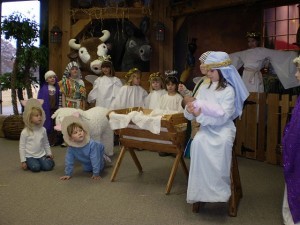Gary Neal Hansen's Blog, page 47
November 16, 2015
Director’s Journal: First Rehearsal

 CC by David Hawgood-SA 2.0
CC by David Hawgood-SA 2.0I used to do a ton of theatre as a kid. I had good directors. I had not-so-good directors. But when I looked in the mirror, what I always saw was one of the actors. Well, my pastor drafted me to direct my new Christmas Play. Yikes!
What am I going to do at my first rehearsal?
Last week I shared the first installment of my “Director’s Journal” — all about the lovely work my pastor did in the background, casting, organizing, and scheduling to make everything work smoothly.
Here’s the second post for any of you who also face directing your first Christmas play.
First Rehearsal
1. Introductions
The day came. We gathered for our first rehearsal. I put everyone in a circle. I opened in prayer, asking God to help us and the congregation live into this biblical story.
And I prayed especially that God would help this play be play. The whole thing should be fun, not a duty or a drag.
I briefly shared the concept: Christmas Play takes all the Gospel passages on the coming of Jesus, from Matthew, Luke, and John, and weaves them into one story. It invites us into the real meaning of Christmas, bypassing all our culture’s excesses.
I encouraged them to spend time with the words they would be speaking, taking it as an opportunity to meditate on the biblical text.
2. First Read-Through
The main task of a first rehearsal is to simply read through the text from start to finish, hearing it as a whole story in our own voices.
Before we started I gave one bit of direction:
Don’t pause between lines. As the last word of the line before your own is being spoken, start saying your line.
That is crucial to keeping a play from dragging.
There are times when a pause is needed to convey feeling and meaning. But if there is a pause before every line, all the good pauses become meaningless.
The first reading took about 20 minutes. Actual run time will probably be a smidge longer than that.
I have to say it was totally cool to hear the play in human voices. I have spent months with these words in my head, but now the meaning of every line got processed through other people’s minds and voices. That adds all kinds of dimensions to the story.
3. Notes
We took a few minutes for questions.
It wasn’t the time to talk acting details for particular parts. Nobody even knew where they would be standing.
Still the first read-through is a great time to begin to think like actors. I gave just one initial note:
As you read each line, and as you go over the play at home, keep asking yourself, “What does this character feel?” And then ask yourself, “What does this character want?”
Those are the simple questions behind the stereotypical actor question,
What’s my motivation?
That is all I said. I’ll surely come back to it as time goes on. I think this is what changes reading into acting.
They need to know the words, of course, but they also need figure out the feelings and desires that prompt those words.
Each actor’s line is part of a story. The overall story is driven by the feelings and desires of the characters as they face the situations the story puts them in.
Finding those feelings is each person’s part of telling a story together. Once they find those feelings and desires they will naturally communicate them to the audience.
4. Second Read-Through
I had to choose how to spend the rest of our time. I had planned to take each of the several lines that are spoken in unison and drill the group on them a bit.
Unison speech is pretty tricky. I may have been foolish to include it.
Actually, the group did quite well with the union bits in the first read through. I thought our time would be better spend just reading it through again in light of my little acting note.
Once more, with feeling!
as the saying goes.
It was subtly, but noticeably, better the second time through. They are doing great. I’m full of hope!
——
Wouldn’t it be fun to see it hit #1 in some category or other? For about a buck you can help me become a micro-best-seller!
The post Director’s Journal: First Rehearsal appeared first on Gary Neal Hansen.
November 12, 2015
Letters to a Young Pastor: Trouble with Old Testament

 cc 2.0 by Wonderlane
cc 2.0 by WonderlaneDear ______:
So classes have started. I love the feeling of new classes. It is like a whole new world is about to open up — all kinds of potential for new discovery.
Sorry to hear that your Old Testament class is giving you trouble though. I’m not exactly surprised, but that doesn’t mean I’m not sympathetic.
I’d have to hear more, but from what you say I think your struggle is a very common one. If its meaning seems closed off and locked up, rest assured you are not the only one who thinks so.
Trouble with Old Testament
It is not the old struggle of what to do with the violence of the OT and things like that. The trouble you face is due to a mismatch between your level of previous understanding and the kinds of issues your professors are addressing.
In any academic program the professors have to make some assumptions about the level at which they will teach their subjects. And many professors, in any field actually, get most excited about teaching things at an advanced level. Or we can forget what it was like to know virtually nothing about the field.
The students are in a totally different place.
A few generations ago, new seminary students came knowing a lot of Bible basics from Sunday School. Their undergraduate work might have included academic study of the Bible.
Today that is not often true. Many are like you, having only come to a growing faith as adults. Often their first seminary-level Bible class is their first reading of the Bible.
If the student is underprepared, and the professor aims high, the results can be disastrous.
When I took my first Bible classes the professors focused on what is called “higher criticism.” That meant traditional positions were called into question — like Moses as author of the first five books, or one guy named Isaiah writing the whole of the book called Isaiah. There are excellent reasons to teach those things.
But higher critical questions had odd results among underprepared seminarians. Those who came from certain backgrounds nearly worshipped the Bible— and intro Bible classes seemed to topple their idol. Those who came from some backgrounds already assumed the Bible was pretty irrelevant — and intro Bible classes seemed to confirm their opinions.
If seminary education leaves both of ends of the spectrum less in love with the Bible’s teachings, that is a problem.
So I don’t want that to happen to you. Here’s my suggested plan.
Get to know the Story of Scripture
First, even if it seems almost too late, get to know your way around the Bible. The OT tells a story — an amazing story of God’s grace and faithfulness.
Read the Bible, apart from class assignments, just to listen to that story.
Find and learn the outline. Write it out on paper.
Discover the main characters, and place them on the outline.
Match each book to the part of the outline it covers.
Good things happen when you know the Bible’s big story. All the little stories within it begin to become part of you.
Over time you will find that the Bible’s story is the story of your own life in relationship with God. It becomes a resource for thinking about your life, and the world, and God. The story begins to give shape and meaning to everything.
Trust me on this. It just has to grow on you.
If you want a great resource to help you get there quickly, check out Henrietta Mears’ classic book What the Bible Is All About. It won’t help you in class. But it will help you get ready for your education.
Learn to Pray the Text
Second, always try to weave prayer into your encounters with Scripture. John Calvin would tell you that you need to pray for God’s Spirit to shed light in your mind or you’ll never learn what Scripture is there to teach you.
Invite God to be present, and to speak to you as you read the Bible each day.
And beyond that, find ways to let the Bible’s words teach you to pray. The Psalms are a rich treasury of ancient prayers. Calvin would tell you that they are there to teach you everything about prayer.
He thought the Psalms were like an anatomy text book for the human soul. Everything you and I face is prayed about somewhere in the Psalms. It gives you permission to pray about anything and everything.
Then the Academic Questions
Finally, once you know the story of the Bible and regularly encounter God through reading it, then you are equipped to face the academic questions your professors are pitching you.
Once you know and love the Bible you naturally want to think about how it came to be, and the ancient layers that you find within it. You’ll be ready to see how every era brings new questions and new insights to the Book of Books.
And since you know the God you meet there, no human question can topple your faith.
Blessings,
Gary
——
Your turn: What helps you find life and faith in the Old Testament?
Let me know in the comments below.
(This post contains an affiliate link.)
The post Letters to a Young Pastor: Trouble with Old Testament appeared first on Gary Neal Hansen.
November 11, 2015
Director’s Journal: Getting Ready

 So I wrote this Christmas Play, and of course I gave a copy to my pastor.
So I wrote this Christmas Play, and of course I gave a copy to my pastor.
Who knows?” I thought. “They always do a play in Advent. Maybe they will think it is fun to produce the world premier!”
They said yes! Woo hoo!
I should know by this time that this amounted to volunteering to direct. Honestly, I had no idea. I was sure the regular team had a lock on directing.
Director’s Journal
W ith fear and trepidation I agreed. I have lots of acting experience, but I’ve never directed. On the other hand I did write the thing.
ith fear and trepidation I agreed. I have lots of acting experience, but I’ve never directed. On the other hand I did write the thing.
Then I thought,
If I’m nervous about directing this play, and I know it inside and out, surely other people might be nervous about it too. Maybe I should blog about the process.
Casting
The pastor handles the casting at my church, even if she doesn’t want to direct. That is great by me.
It is totally different from what I’m used to. In school plays and community theater casting is a drama in itself: auditions, call backs, posting of cast lists. Excitement. Heartbreak.
I don’t think the whole audition thing would work well in our church. It needs to be more of a draft. The fact that Pastor Kat had a clear idea of who liked to participate and whose arms might be twisted was a huge relief.
I suspect that in most churches putting on a play starts with recruitment rather than auditions. I think the word got spread through the Sunday School to make sure those who wanted to be in got in, but from there the roles were efficiently filled.
Getting Ready
Having written the play, I had imagined every movement in detail, and put pretty detailed stage directions in the script. That shortened up the preparation time.
Anyone else would need to read it through multiple times, probably at the kitchen table moving through the action with salt for Mary, pepper for Joseph, sugar bowl for the manger, etc.
A rehearsal schedule needed to be worked out. Pastor Kat to the rescue once more. She’s done this for years, so she did what hadn’t occurred to me:
She plotted the dates for five rehearsals. It might be pulled off with fewer, but five gives us some leeway.
She divided the cast as follows:
The Narrator, Gabriel, Mary, Joseph, Herod, and “Law and Prophets” are in all rehearsals, but the rest of the roles are in three groups:
“Group A” adds Zechariah and Elizabeth, who are only in the first half.
“Group B” adds the Innkeeper, Shepherds, Angels, Wise Men, Simeon, and Anna, who appear in the second half.
“Group C” is any additional younger Shepherds, Angels, Wise People who may enlarge the cast.
Then she placed the groups on a schedule:
Rehearsal 1: 1 hour. Groups A and B
Rehearsal 2: 90 minutes. Group A (first 45), Group B (last 45)
Rehearsal 3: 45 minutes. Groups B and C
Rehearsal 4: 90 minutes. Groups A & B (full 90), Group C (last 30)
Rehearsal 5: 90 minutes, dress rehearsal (A, B, & C)
Way to go Pastor Kat!
All of this makes my work much easier. I’m still heading out into uncharted territory, but I’ve got resources and some great company.
I’ll keep you posted about our progress…
——
If you are interested in getting a free copy of my Christmas Play, or if you would like to produce it in your church this year, click here.
The post Director’s Journal: Getting Ready appeared first on Gary Neal Hansen.
November 6, 2015
Christmas Play: Giving You Back Your Treasures

 CC by Wesley Fryer — SA 2.0
CC by Wesley Fryer — SA 2.0There really is a common thread holding together all the posts on my blog.
(Well, almost all of them.)
Let’s see if you can find it. What do the following have in common:
A post on a saint from the Middle Ages.
A post on a section of the Heidelberg Catechism.
A post on a classic way of discerning the will of God.
Answer? All of these are to my attempts to mine the best of the Christian past. In everything I write about I’m trying to look for wisdom from the past to follow Christ better today.
Another way I like to talk about it is this: I’m giving you back your treasures — things Christians today have lost but never even know they owned.
By not knowing our history, we’ve lost some of the best things we ever had. And we don’t even know they’re gone.
Christmas Play
 For about the past six months I’ve been working on a side project that I haven’t talked about on this blog very much. It’s a play, a Christmas play for production in churches.
For about the past six months I’ve been working on a side project that I haven’t talked about on this blog very much. It’s a play, a Christmas play for production in churches.
I gave it a clever title. I call it “Christmas Play.”
It will soon be available on Amazon and elsewhere online — probably a little late for most churches to think about producing in 2015, but who knows?
In my Christmas Play the text of the Bible, the story of the coming of Jesus Christ, becomes the script.
But,” you say, “Christmas isn’t lost. Those nativity stories are right there in the Bible. Thousands of churches act them out in plays and pageants every December.”
Well, I beg to differ. I think these treasures have been pretty well hidden.
Yes, the story of the coming of Jesus is in the Bible. But a lot of Christians have lost the habit of even opening up Scriptures. There is a lot in the nativity stories that people just don’t know anymore. You’ll see.
Yes, churches have pageants, with shepherds in bathrobes. They are adorable. But our pageants rarely enact the whole biblical story of Christ’s coming.
We never have the kids explain, as John did that this Jesus who is born is actually the eternal Word, who was with God in the beginning. We don’t act out the idea that he is God.
And we never, never include the tragedy of Herod’s slaughter of the innocents — but all of this, and more, is part of the drama that Scripture portrays.
Yes, there are dozens of Christmas plays out there. But so many try so hard to be so modern that Jesus’ birth becomes a sort of afterthought. The play becomes a set-up to complain about misbehaving kids, or greedy Christmas lists, or materialism, or holiday distraction and busyness.
Then they shoehorn in the bathrobe nativity almost as a sidelight.
So I wrote this Christmas play. The kind folks at Crossway gave me permission to use the ESV text with its classic accessible language.
It’s all straight from the Bible — every passage on Jesus’ coming from Matthew, Luke and John.
It starts before the foundation of the world.
It includes the great songs of Zechariah, Mary, and Simeon.
It shows the coming of the Light — the Light that the darkness can never overcome.
Oh yes: the shepherds are there. The Angels too, and the Magi.
The kids can wear their bathrobes. Grownups too. (It’s intergenerational.)
But they get to tell the whole story.
You can pick up a free copy right here on this site. Check it out. Let me know what you think.
The post Christmas Play: Giving You Back Your Treasures appeared first on Gary Neal Hansen.
October 29, 2015
Letters to a Young Pastor: How to Get the Most out of Seminary

 cc by takoradee-Share Alike 3.0
cc by takoradee-Share Alike 3.0Dear ______:
Glad to hear you are enjoying orientation and the ramp-up to the new semester. I remember how exciting and important registration always felt. You want to know how to get the most out of seminary. As you put it so well,
Seminary life seems like a smorgasbord. I almost have too many choices.
Classes are not the whole picture, but they are crucial.
Of course a lot depends on the kind of seminary you go to.
Some seminaries are like the fancy “prix fixe” restaurants: Rather than a menu they serve up one lovely meal each night. You eat what is set before you.
You’ve chosen a seminary that is more like the old “Royal Fork” buffet in the town where I grew up. You have almost infinite choices.
(The metaphors here are ironic. For a seminary to have a smorgasbord of choices it typically has to have be large and affluent–quite unlike my neighborhood buffet.)
But when you went to the buffet restaurant as a kid you didn’t get to fill your whole plate with pie and cake. Your parents insisted you choose from all the food groups, with meat, veggies, and other healthy stuff.
Your seminary is probably going to act a bit like your parents: You’ll have to get a certain number of courses in Bible, a certain number in history, and theology, and various aspects of the work of ministry.
That is probably a good thing. It may not be enough.
After graduation I was talking to one of my classmates.We had gone to the same school and gotten the same degree. He asked me
How come you got a better education there than I did?
To get the most out of seminary, choose the long game.
Every semester you will have a rich variety of choices in front of you. Every course being offered is probably going to be stimulating. Across the disciplines, you can almost peg your classes to a timeline:
TODAY classes focus on a burning hot topic that is crucial in our culture right now.
TOMORROW classes focus on specific ministry skills you will need as you step into vocational ministry.
YESTERDAY classes focus on ancient texts, long-ago thinkers, and traditional teachings.
These are all really great. You don’t want to miss any of them.
But you can’t take all of them. And a whole lot of students are drawn to them in descending order:
Today is exciting.
Tomorrow is clearly coming.
Yesterday? Maybe. If there is time. Someday.
How to Get the Most out of Seminary
My advice? Take the opposite approach in your priorities:
Focus on Yesterday.
Make it your goal to build a solid foundation in Bible, history, and doctrinal theology.
You have to know what the faith is, and what the church is, and to discern what health and growth is like for individuals and churches.
You need to know these foundations to minister wisely for a lifetime. If you skip these now you’ll probably never take the time to study them later.
Give solid attention to Tomorrow.
You are going to be doing ministry for a living. You need the best input you can get.
You need to learn how to stand up and preach a sermon so people grow in the faith, to lead worship so that you guide people into the presence of God to teach, and counsel and build community.
But do Tomorrow with a strong foundation in Yesterday.
Don’t go through seminary trying to collect program ideas and sermon illustrations. You’ll use up your education in a couple months.
Do enough of Today to integrate Yesterday and Tomorrow.
A lot of classes on hot issues will (often quite rightly) engage critically with the Church and its teachings in the past. You will only be equipped to participate well in that process if you actually know something first-hand about Bible, history, and doctrinal theology.
Without focusing first on Yesterday you run the risk of superficial judgments. You might reject the very resources that could have given you wisdom for Today.
Know the past and your courses on hot issues are a fantastic opportunity to think through the issues of your ministry Tomorrow.
Can’t wait to hear what you sign up for!
Blessings,
Gary
————
I’d love to hear from you in the comments! Let me know about where you learned most about the “yesterday” “tomorrow” and “today” of your faith and ministry.
This post is part of a new series. To read from the beginning click here.
The post Letters to a Young Pastor: How to Get the Most out of Seminary appeared first on Gary Neal Hansen.
October 22, 2015
Letters to a Young Pastor: Welcome to Seminary

 cc by Creative Commons via Flickr 2.0
cc by Creative Commons via Flickr 2.0Dear ______:
Welcome to seminary! You’ve made it. That’s great. Thanks for letting me walk with you through the process of listening for God’s call.
As I said when I saw you, I think you’ve made a good decision. It isn’t the only good decision you might have made: You could have served God as an app developer too. Or a social worker, for that matter, or a lawyer — I’ve always thought you would make a fine lawyer.
But seminary is an excellent choice: you’ll learn a lot, both about the faith and about yourself, and a seminary degree is a necessary step on the path toward being a pastor, at least in your denomination.
You will meet some amazing people in seminary — if you have eyes to see.
Probably many of the people you meet will have a lot in common with you: they too feel called to ordination and pastoral ministry.
Of course some of those you meet in seminary are on very different paths.
Some of them are from denominations that don’t require a Master of Divinity degree.
There are quite a lot of denominations like that, where your own inner sense of call and the local church’s affirmation are really all you need. These are the admirable ones, to my mind. They are investing a lot of time and money because they want to learn, not because they need the degree to get a job.
Others are not pursuing ordination or pastoral ministry at all.
The seminary I went to had a Ph.D. program as well as an M.Div. A whole lot of the students were aiming to get into doctoral programs and teach somewhere.
Some seminarians want some theological training to be better grounded as counselors, or mission workers, or whatever.
I’m not sure if this is the case at your seminary, but at some schools you would also meet a couple other kinds of students.
Some will be fresh from an adult conversion.
That’s where you almost found yourself a while back: newly alive in Christ, and only able to make sense of that faith by entering professional service. Pray for these people: graduate study in theological disciplines isn’t actually a great place to start.
Some will not have even have had that adult conversion.
These are explorers, spiritual seekers, who really want to take the questions seriously. If their friendship network doesn’t include any smart and mature Christians it may feel like the only viable choice.
Pray for them too. Graduate level study helps most if you have already answered the single biggest question: whether to follow Jesus, seriously and passionately, for life. If that’s an open question, seminary may not help so much.
And some will seem completely antagonistic to what seminary has to offer.
Pray for them too. Pray especially for them. They may be rebelling against their family’s or church’s rigid and constraining religion. They may have been pressured into a calling that doesn’t actually fit. They may just be cranky and cantankerous — and they may not even know it.
So here’s my advice to you as you find your way in this new community:
Aim to be Christ’s servant and ambassador, right now, among all these people.
Fight the temptation to pigeon-hole everyone you meet into one of the handy categories I’ve just outlined.
Aim instead to love them as Christ has loved you.
That includes learning from them and sharing your own perspective with them.
Christ walked patiently with you through some serious ups and downs and dead ends before you found your way to living faith. You can do the same for the people around you.
Seminary is part of your training for a life of ministry. That life is largely about loving others toward Jesus.
Start now. You’ll grow into it. Plus you’ll make some amazing friends.
Blessings,
Gary
————
I’d love to hear from you in the comments! Who were the most interesting and surprising people you met in seminary?
This is the first post in a new series.
To go to the start of the original pre-seminary series, click here.
The post Letters to a Young Pastor: Welcome to Seminary appeared first on Gary Neal Hansen.
October 21, 2015
Join my “Review Crew” and help launch my new Christmas Play!

 I’m about to publish a Christmas play. (I call it “Christmas Play.” Pretty catchy, eh?) I am totally psyched about this project.
I’m about to publish a Christmas play. (I call it “Christmas Play.” Pretty catchy, eh?) I am totally psyched about this project.
It is designed for production in churches. It focuses squarely on the real Christmas story, weaving the biblical text of every Gospel passage about the coming of Christ into one story.
I’d love to have you on the Launch Team!
This is a pretty minimal launch, aiming just for Amazon reviews, spreading the word, and getting some churches to consider producing the play.
If you click the button below you’ll go to a page that asks for your email (so we can brainstorm launch strategies) and your snail mail address (so I can send you paperback copies). Then we’ll be good to go.
If you sign up, here’s what I’ll do:
I’ll send you an advance eBook copy of the play.
I’ll send you two signed paperback copies of the play.
If your church decides to produce it in 2015, I’ll grant free permission to photocopy scripts instead of buying them (That’s a $20 discount on the site, and a huge savings on what they will cost on Amazon.)
I’ll give sincere and hearty thanks to God for your partnership in the process.
And I’ll add you to my new Review Crew and keep in touch about new books.
Each time I have a book coming out, I’ll send you an advance eBook copy (publisher permitting) so you can review it on Amazon, and ask if you want to be part of its Launch Team.
Your part will be pretty simple:
Post an honest review on Amazon as close to launch date as possible.
Consider producing the play at your church this year, or pass the word to the people who make such decisions.
Give your second copy of the script to a pastor or decision maker at another church with your honest endorsement.
Sound good? Let’s go for it!
Just click on this button:
Blessings,
Gary
The post Join my “Review Crew” and help launch my new Christmas Play! appeared first on Gary Neal Hansen.
October 15, 2015
Letters to a Young Pastor: Setting Sail

 Dear ______:
Dear ______:
Here’s the thing: in the end you have to choose. It is time for setting sail.
You might be St. Francis, choosing after a direct message spoken by Christ.
You might be a disciple, choosing based on what you think will best serve the kingdom.
And then again, you might not have the slightest hint of what God wants.
But you have to choose.
Doing nothing is also a choice — in the parable that was burying the resources master entrusted to you. It is the one act that the master disapproved.
God guides us with his Spirit.
What you need is the Spirit’s help. You may already know that, in both Old Testament Hebrew and New Testament Greek, the word we translate “Spirit” also means “wind.”
Too often, when we seek guidance we confuse the Spirit with the Word.
Yes, God has spoken, and finding God’s way entails listening carefully to the Word.
But God also directs and guides us with the Spirit’s breezy influence.
If the Spirit is God’s wind, you probably shouldn’t expect it to provide words. You should expect the Spirit to do for you what the wind does for a sailboat.
Think of yourself as a yacht.
 photo D Ramey Logan by WPPilot – Own work. Licensed under CC BY-SA 3.0
photo D Ramey Logan by WPPilot – Own work. Licensed under CC BY-SA 3.0So you are a yacht, a graceful sailboat, created by God to serve God’s purposes.
A boat can’t stay in dry dock. To fulfill its nature the it has to float in a body of water.
Once in water, a yacht shouldn’t stay tethered to a dock. To fulfill its purpose it has to push off.
To do anything useful, a yacht needs a smart skipper at the helm. That’s your brain. You will need discernment to know where to go — that’s choosing.
And then you will need to use your savvy to help the boat (your life) get there using the opposing forces of sea and the wind.
It isn’t so simple as letting the water move you. The tide and the currents would take you somewhere, but where?
It also isn’t so simple as letting the wind move you. If you put up a sail on a flat bottomed boat, you will skim along wherever the wind blows. If you find your way to port it will be by sheer luck.
A yacht needs tension and stress to move.
Your sailboat is designed to live in tension between wind and sea, so that you can get where you want to go.
It has a keel from bow to stern, poking down into the depths. That keel keeps the boat moving on a line.
Try to move the boat sideways through the water and resistance holds it back.
Push it along the keel and it cuts its way through the sea.
You put up your sail and you catch the wind. It pushes against the broad surface of the sail, thrusting the boat through the water along its keel.
Trouble is, the wind isn’t blowing where you want to go.
 And you can’t go directly into the wind.
And you can’t go directly into the wind.
But, if you skillfully use tension between wind and water you can zigzag your way pretty much anywhere.
Remember I’m talking about guidance here.
You need to have a keel too, some weight pulling you down; be grounded in Christ.
And you need to have something like a sail to catch God’s wind — some practices that get you to ask questions and listen for answers.
There will be tension between your groundedness and the Spirit’s nudge. You will need to move the rudder so the Spirit’s influence moves your life where discernment has chosen.
You have to aim wrong.
And you will make mistakes in setting your course. Actually you have to. Your goal is to reach God. The Spirit is God. God’s Spirit is the wind — and no sailboat can sail straight into the wind.
A yacht reaches port by aiming wrong—over and over.
Say your destination is due North, and the wind is coming at you out of the North. You tack back and forth, Northwest, then Northeast, then Northwest again. Over time you move North to harbor and home.
You keep adjusting your keel by directing the rudder.
You keep adjusting your sail by moving the boom.
You keep the tension, the stress, where you need them so that the boat eventually goes where you need it to.
And if you are a follower of Jesus, at any given moment you are not aiming directly toward harbor. You are constantly off the mark relative to your final destination: you are either zigging too far one way, or zagging too far the other.
You keep going, keep tacking, and you get there.
Setting Sail
So you do have to make some big choices. The thing to do in the meanwhile is make excellent little choices.
Keep a strong keel by living in the depths. Come back again and again to dwell in the Scriptures. Come back again and again to prayer. Worship with the community receiving Word and Sacrament. Keep learning, serving, growing. Pay attention to what matters.
Keep your sail up, doing what you need to do to catch the Wind of the Spirit. One excellent tool for that is to write about your life and your faith in a journal. Use it as a tool to listen for the rustle of the Wind in you and around you. Take up a practice like lectio divina or the examen so that you are actively receptive to that Wind.
So now it is time. Push of from shore. Hoist your sail.
Which direction will you choose?
Blessings,
Gary
————
Now it’s your turn: When did you find your way closer to God’s goal by “aiming wrong”? Let me know in the comments below…
The post Letters to a Young Pastor: Setting Sail appeared first on Gary Neal Hansen.
October 12, 2015
Helping Christian Communities Thrive: Keep Central things Central

 CC BY b k-SA 2.0
CC BY b k-SA 2.0As you think about what your Christian community should be all about, I suggest an experiment: keep your focus on just four key practices. For thriving community over the long haul, keep central things central.
I’ll tell you a secret: That’s the biblical approach.
It is also a good pragmatic approach.
Think of the community like a tree. You don’t need to invent something new for it to grow in. You need soil. You don’t need to invent something new to help it grow. You need water and sunshine.
There are certain priorities and practices that are central. Keep central things central and Christians grow together in ways that are identifiably Christian. They put down deep roots and they send their branches wide to the world.
for the tree is known by its fruit. (Matt. 12:33)
and the leaves of the tree are for the healing of the nations. (Rev. 22:2)
There are, in fact, some basic elements, priorities, practices.
We’ve known them from the beginning. Like from Acts chapter two, the first Christian Pentecost.
You remember: Peter preached to an international crowd gathered for the Jewish feast. Three thousand came to new faith in Jesus. Then two things happened:
First, they took up four central practices:
They devoted themselves to the apostles’ teaching and fellowship, to the breaking of bread and the prayers. (Acts 2:42, NRSV)
Second, people were drawn to join them.
And day by day the Lord added to their number those who were being saved. (Acts 2:47)
What will your community do?
Everyone seems to be searching for Christian community, or planning to build one — but what is it? Mostly we are left to our own imaginations.
We develop elaborate plans, and programs and mission statements. We use our best insights. We build according to our best visions.
We usually start at the far end of the process: we set out to be more active in mission.
We do a demographic study. We have a vision for a program or service project.
Then we wonder why it is so hard to get people to buy in.
Or we wonder why they burn out.
It is because, instead of tending to roots, we focused on fruits and leaves.
Your Mission: Keep Central things Central.
What if your new worshipping community took up these four practices and made them central to your life together?
Don’t make the mistake of thinking this means just doing what you are already doing. Take seriously the possibility that what the average congregation does is a mere shell or shadow of devotion to
the apostles’ teaching and fellowship, to the breaking of bread and the prayers. (Acts 2:42, NRSV)
Each of the four practices sets a high bar. Taking even one of them seriously will require restructuring the way a community operates.
What if your dying congregation decided to make a radical change and go deep in all four of these core practices?
Maybe grounding your life together in these central things will build new health.
If you build life on these four practices, I suspect that three things will happen:
First, each member will find faith and devotion to God deepened.
These four community practices help each individual build a deeper relationship of love and trust with God.
When the whole community is doing these things, life together will support each member’s life of prayer, Scripture, the Eucharist — and those, taken seriously, make for a passionate, life-giving relationship to God.
Second, each member will find relationships deepening within the community.
One of the four practices is to take fellowship seriously — not just coffee hour, but relationships that matter. The community will have to help relationships grow.
It may be through small groups, or prayer partnerships, or regular shared meals, but it will have be intentional.
Once you create the opportunities, and make those opportunities part of the general practice, relationships will grow deeper.
But the other practices build relationships too.
Sharing the Eucharist teaches and expresses our communion as the Body of Christ.
Exploring Scripture together gives us a shared language of faith, and a shared set of stories through which to understand our lives.
Praying together not only bares our souls to God but creates intimacy and support between us.
Third, each member, and the community together, will find themselves move involved in God’s mission.
Focusing on life together is a catalyst for participating in God’s mission.
That is the paradoxical one. Usually groups set out on mission and find themselves running on empty.
Consider the possibility that it actually works better the other way around:
We keep central things central, put down deep roots by focusing on core practices.
The new life of Christ bubbles up in each of member and in all as a body.
The Christian community becomes healthy enough and strong enough to participate in God’s mission.
If your community’s life together built faith that was deep, wise, and confident, Christians who were full of life, growing whole and strong, what might they do together?
They just might be have good news to share with their co-workers and neighbors.
They must might develop their own ideas of how to serve the world around them.
They might find their lives, and their life together, bearing witness to new life in Christ.
They might find that people want to come and be part of that.
Then again they might not. But at least if they keep central things central, they’ll know that what they are building is really Christian community.
The track record.
Time and again in the history of Christianity, followers of Christ have been innovative in creating Christian community.
Time and again, when Christian community is shaped around living the gospel, it deepens members’ connection to God and fires them up to serve God in the world.
I’ve already blogged about a number of examples of this: Benedictine monasticism, John Wesley’s early Methodism, John Calvin’s Geneva. I’ll be exploring more as time goes on.
Now it’s your turn:
Which of these practices have you seen in healthy community?
Which do you most wish you could deepen in your community?
Let me know in the comments below!
The post Helping Christian Communities Thrive: Keep Central things Central appeared first on Gary Neal Hansen.
October 8, 2015
Letters to a Young Pastor: Getting God’s Will Wrong
 San Damiano Cross
San Damiano CrossDear ______:
When you have to choose a path, it does put the pressure on. You are afraid of getting God’s will wrong. Sorry: I didn’t mean to upset you.
But my question from a few letters back is serious: What if you really couldn’t make a fatal mistake?
Getting God’s will wrong.
Let me tell you a true story of someone who got exactly what you want (a direct voice from God) but still totally made the wrong decision — and who found out God could work perfectly well through his mistake.
It was the 13th century. Francis of Assisi was passionately devoted to following Christ. Jesus told his followers to go as beggars (Luke 10:4-7) so he decided to be one too.
He was spending his time in the ruin of an old chapel, the shrine of San Damiano. There was still a crucifix there, and it was before him as he prayed. Suddenly the image of Christ spoke to Francis:
‘Francis,’ it said, calling him by name, ‘go rebuild My house; as you see, it is all being destroyed.’”
St. Francis of Assisi had a vision and still got it wrong.
In retrospect it is clear: God wanted Francis to lead a deep work of reform in the whole of the Western Church.
He thought he was supposed to rebuild the broken-down chapel. So stone by stone, the little raggedy beggar began restoring San Damiano.
One is tempted to call this a dumb mistake.
And yet God used Francis.
Despite Francis’ low aim, God began to rebuild the Medieval Church through him. One by one, men and women came to join him.
They lived in poverty. They preached the Gospel. They cared for the poor.
 Giotto — Dream of Innocent III
Giotto — Dream of Innocent IIIEarly on Pope, Innocent I saw the real importance of this whimsical Christ-like leader. He dreamed that this little man in rags was lifting up the great Roman church of St. John Lateran.
Francis inspired others to become radical disciples. They became an enormous movement, leaving everything to follow in the way of Christ.
There were 3000 in the movement in 1221, just 11 years after his order was founded. By 1300 it is estimated that there were 60 to 90,000.
Make a great mistake.
Francis blew it — and drew thousands to follow Jesus and live his mission.
I suspect that you and I will get God’s directions wrong too.
I’m confident that even if you get it wrong, God will use you.
Listen. Choose. Follow.
The thing to do is to try to listen, choose what seems like the right path, and follow.
The rest is in God’s trustworthy hands.
Blessings,
Gary
————
This post is part of a series. To start at the the beginning, click here.
The post Letters to a Young Pastor: Getting God’s Will Wrong appeared first on Gary Neal Hansen.




